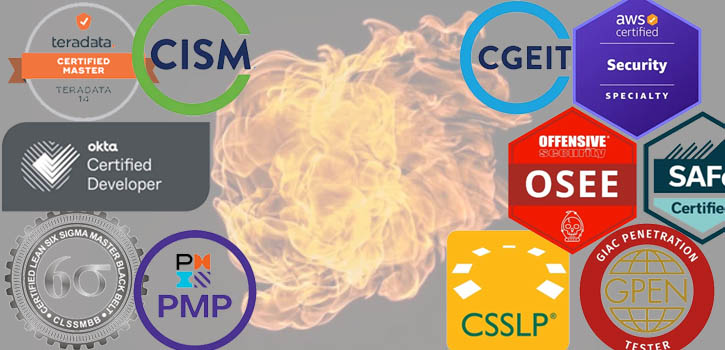11 Hot IT Certifications For 2023
IT management and cybersecurity certifications continue to offer very high pay premiums -- and their value is growing.

People who are just starting their IT careers often ask whether it’s worth it to get a certification.
The answer is: It depends.
If your purpose in getting a certification is just to land a job, a cert might help you distinguish yourself. According to Robert Half, “Whether you’re a recent graduate or seasoned tech specialist, preparing for and attaining a certification is a great way to expand your skill set, impress prospective employers and stand out from the crowd.”
On the other hand, if your goal is to maximize your earnings, the story around certifications becomes more nuanced.
Overall, the value of IT certifications has been trending downward for several years, according to the researchers at Foote Partners. They measure the pay premium, the average amount of extra pay someone with a certification earns compared to someone who doesn’t have the certification, for both certifications and non-certified job skills. For 2022, the firm reported that the average market value of the 595 certifications they track declined 1.1%. Still, the average certification offers a 6.6% boost in base pay, which isn’t nothing.
It’s worth noting, however, that not all certifications are created equally.
Some certs continue to command a very high pay premium, and some are increasing in value very rapidly. In particular, certifications related to IT management and security can be extremely valuable.
Skillsoft, which also publishes a list of high-paying certifications, notes, “As the skills gap continues to impact businesses in critical areas like cloud, data science and cybersecurity, organizations seek out those professionals with reputable credentials that validate their experience and capability. In turn, these certified professionals tend to enjoy more leverage in the marketplace because they’ve earned certifications recognized as trustworthy affirmations of their skills.”
The following highlights 11 certifications that are particularly hot right now. They all offer higher-than-average pay premiums, and they were increasing in value very quickly at the end of 2022, as reported by Foote Partners.
11. Teradata 14 Certified Master
The first certification on this list is one of several that were tied for sixth on Foote Partners’ list of the top IT certifications in 2022. The Teradata 14 Certified Master is for data analysts, architects, and engineers who demonstrate that they have the knowledge and skills relevant to designing, implementing, and managing a Teradata data warehouse. The certification has an average pay premium of 11% and in the six months prior to January 31, 2023, its market value increased by 10%.
As the most advanced of the several different certifications offered by Teradata, the Certified Master designation has fairly robust requirements. It requires at least 5 years of relevant experience as well as the completion of every Teradata 14 exam on the track, up and until the TEO-147 comprehensive mastery exam.
10. Six Sigma Master Black Belt
Six-Sigma Master Black Belt is the highest-level of certification within the Lean Six-Sigma approach to business strategy. This approach emphasizes optimizing for efficiency by eliminating wasteful uses of resources and defects in the production process. Because companies from many different industries see expertise in lean six sigma as a valuable asset, the certification currently boasts an average pay premium of 10% and a market value increase of 11%.
To obtain this certification you must already be Six Sigma Black Belt Certified. To move from a Black Belt to a Master Black Belt, you pass a 60-minute, 50-question test. The total cost for the test and certification is anywhere between $400 and $900, depending on where you take it.
9. SAFe Certification
SAFe stands for Scaled Agile Framework, a popular Agile framework that enables customers to create enterprise solutions for organizations. Given how common SAFe is, obtaining this certification can often make you significantly more competitive for many different IT positions. It was one of the several certs tied for sixth on Foote Partners’ list with an 11% pay premium and a market value increase of 10%.
The majority of SAFe certification programs don’t have educational or professional requirements, but they do require the completion of a two-day course and passing a 90-minute 45 question exam. Prices for this course vary depending on the time and location where it’s taken.
8. PMI Program Management Professional
PMI offers the Program Management Professional certification, a general project manager cert directed at project managers in almost any industry. Even though it is not an IT-specific, it is still a valuable certification for IT project managers to obtain. It has an 11% average pay premium and recently increased 10% in market value.
To become a certified Program Management Professional, you must either have 48 months of project management experience and 84 months of program management experience, or a four-year degree and 48 months of program management experience. Additionally, you must complete an exam that costs $800 for PMI members and $1000 for non-PMI members.
7. ISACA CISM and CISA
Owing to their similarity, ISACA’s CISM and CISA are combined in this slideshow. CISM stands for Certified information security manager. Robert Half Technology describes the CISM as “The leading credential for information security managers… designed for people who design, build and manage information security programs.” The CISA, which stands for Certified Information Systems Auditor, is also a useful cert for IT security managers. As the name suggests, it is specifically directed at IT security professionals who work in auditing and control.
Both the CISA and CISM certifications require taking a multiple-choice exam that normally costs $760. However, in both cases this is reduced to $570 for ISACA members. CISA and CISM certifications also both require you to have at least 5 years of IS experience, and CISM requires an additional 3 years of experience as a security manager.
6. Certified in the Governance of Enterprise IT
The Certified in the Governance of Enterprise IT (CGEIT) is a framework-neutral enterprise IT certification awarded to those who demonstrate experience in IT resources, governance, and risk optimization. It was intended for those who already significant managerial experience related to the governance of enterprise IT and is universally recognized as one of the best certifications in the IT security industry. According to the Foote Partners report, the CGEIT has an average pay premium of 11% and its market value increase of 10% for the six months ending January 1, 2023.
Obtaining this cert requires passing a 4-hour in-person exam of 150 multiple choice questions. The comprehensive exam is divided into 5 different domains: framework for the governance of enterprise IT, strategic management, benefits realization, risk optimization, and resource optimization. As with the CISM and the CISA, the exam costs $760 for non ISACA members and $575 for members. There are also additional work requirements and annual fees you will have to pay to maintain your certification.
5. AWS Certified Security – Specialty
According to its website, Amazon’s AWS Certified Security -- Specialty “validates your ability to effectively demonstrate knowledge about securing the AWS platform.” Specifically, it demonstrates one’s understanding of AWS data protection mechanisms, specialized data classifications, data inscription methods, and several other skills relevant to AWS security. It is widely well regarded as one of the most valuable IT certifications. Its average pay premium is 11% and its market value increase was 10%.
The exam for obtaining this certification lasts for 170 minutes and consists of 65 questions, which are either multiple choice or multiple response. It is offered both at in-person testing centers and in an online proctored format and costs $300 to complete.
4. Offensive Security Exploitation Expert
Offensive Security Exploitation Expert (OSEE) is the most comprehensive of the many certifications offered by OffSec. It indicates that the recipient has advanced knowledge of modern bypass methods and is an export on exploit development for Windows-based platforms. A coveted certification, it commands an 11% pay premium, and its market value increase of 10% in the six months through January 1, 2023.
The OSEE is a very difficult certification to earn. It requires you must take an advanced Windows exploitation course in person and pass a 72-hour practical exam following the completion of the course. The rigorous course is offered once every year at BlackHat USA in Las Vegas, and it costs $5,000 to enroll.
3. GIAC GPEN and GWAPT
The two GIAC certs from the Foote Partner’s list are combined on the slideshow because they are very similar to one another, and they are tied in terms of average pay premium. Both the GIAC Penetration Tester (GPEN) and the GICA Web Application Penetration Tester (GWAPT) certifications focus on penetration testing, but the GWAPT is distinct in that it is solely dedicated to the penetration testing of web applications. Both certs are valuable to obtain, offering an average pay premium of 11% and a market value increase of 10% in the six months up until January 1, 2023.
Both the GPEN and GWAPT certifications require you to pass a 3-hour exam of 82 practical questions that involve performing tasks that mimic those you are likely to perform in an actual job role. Both certifications are fairly expensive with the GPEN cert costing $2500 in total and the GWAPT costing around $2000.
2. Okta Certified Developer
Okta is one of the largest identity management services in the world. It provides organizations with a number of different services that allow organizations to manage digital identities in a way that is both centralized and secure. Okta offers many prominent IT certifications, but the Okta Certified Developer Cert offers the greatest potential to increase earnings, with an average pay premium of 12% and a market value increase of 9.1%. Interestingly, this is one percent higher than the Okta Certified Professional certification, the other Okta certification on the Foote Partners list. It has an average pay premium of 11% and a market value increase of 10%.
To become an Okta Certified developer, you must pass a timed 150-minute, proctored exam that includes 45 multiple choice questions and 4 performance-based hands-on use cases. The exam costs $250.
1. Certified Secure Software Lifecycle Professional (CSSLP)
Certified Secure Lifestyle Professional (CSSLP) is a certification offered by the (ISC)2 cybersecurity professional organization. Software developers can obtain it in order to demonstrate their expertise in application security. It carries a 12% pay premium, and its market value increased by 9.1% in the six months through January 1, 2023.
Qualifying for the CSSLP requires you to have a relevant bachelor’s degree in addition to at least 3 years of paid work experience in a relevant field. Alternatively, you can qualify for a CSSLP without a college degree by having at least 4 years of relevant experience. To actually obtain the certification, you must pay $599 to take an exam of 125 questions and obtain a score of 70% or higher. In addition to passing the exam, you must also be an (ISC)2 member which requires an additional fee of $125.
Originally Published On: https://www.informationweek.com/strategic-cio/11-hot-it-certifications-for-2023
Share your comments on this Article:(0)
Leave a Reply
